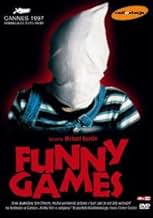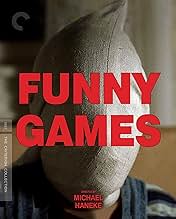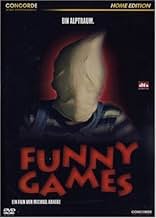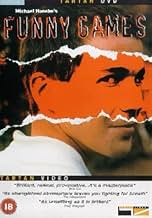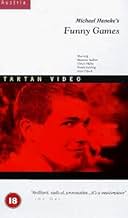Funny Games
- 1997
- 16 avec avertissement
- 1h 48min
Deux jeunes hommes violents prennent une famille en otage dans leur chalet de vacances et les force à jouer à des "jeux" sadiques entre eux pour se divertir.Deux jeunes hommes violents prennent une famille en otage dans leur chalet de vacances et les force à jouer à des "jeux" sadiques entre eux pour se divertir.Deux jeunes hommes violents prennent une famille en otage dans leur chalet de vacances et les force à jouer à des "jeux" sadiques entre eux pour se divertir.
- Réalisation
- Scénario
- Casting principal
- Récompenses
- 5 victoires et 9 nominations au total
Avis à la une
I don't know what to rate this. Although I can appreciate what Haneke was going for, the morally condescending tone didn't work for me. While you could write a book on the topic, I'll keep my thoughts short: humans have a fundamental craving for violence, and I can differentiate violence in media from violence in reality. His message just ended up falling flat. There wasn't any deeper criticism of violence and I didn't walk away feeling wrong or like I should have a new perspective on the matter. Yet I still didn't dislike it... The film was expertly crafted for his intentions, was adeptly acted, and I was kept engaged. Does that make me his target? Is it just pretentiousness? I'm not sure.
6.4/10
6.4/10
In this cross between Who's Afraid Of Virginia Woolf and A Clockwork Orange, two insolent young psychopaths torment a vacationing family.
It was hard to organize my thoughts on this movie, never mind rating it. As a thriller, this is a tense, well-acted, and relentless experience, marred only by a contrived sequence two-thirds through in which characters behave in unbelievably stupid fashion. However, said sequence is preceded by an incredibly effective ten-minute take. Unusually lengthy takes are often deemed self-indulgent, but this one is anything but.
As an ideological statement, though, this film is a failure. And there is no doubt that writer-director Michael Haneke is trying to make a statement. By having one of the psychos address the camera a few times, saying things to the effect that they have to give the viewers their money's worth, Haneke is essentially wagging his finger at anyone who has ever enjoyed the portrayal of violence in a film. This theme is certainly open to debate, but the problem is that Haneke expresses it in such a condescending way. His harrowing treatment of violence already serves as an excellent counterpoint to other films that glamorize it. There was no need to then leave viewers feeling as though they'd just been lectured by a stern parent.
The last time a filmmaker made me angry, it was when I saw Independence Day, and it was for the same reason. In both cases, the writer and the director display contempt by assuming their audiences are idiots. My anger didn't really ignite, though, until I watched a short interview with Haneke on the DVD. It made me never want to see another one of his films. The man is disgustingly full of himself.
So why the relatively high rating? Because as pretentious and self-important as Haneke is, he is also very talented. The movie is very effective on an emotional level, and it's possible to watch it while ignoring the director's wrong-headed decisions.
It was hard to organize my thoughts on this movie, never mind rating it. As a thriller, this is a tense, well-acted, and relentless experience, marred only by a contrived sequence two-thirds through in which characters behave in unbelievably stupid fashion. However, said sequence is preceded by an incredibly effective ten-minute take. Unusually lengthy takes are often deemed self-indulgent, but this one is anything but.
As an ideological statement, though, this film is a failure. And there is no doubt that writer-director Michael Haneke is trying to make a statement. By having one of the psychos address the camera a few times, saying things to the effect that they have to give the viewers their money's worth, Haneke is essentially wagging his finger at anyone who has ever enjoyed the portrayal of violence in a film. This theme is certainly open to debate, but the problem is that Haneke expresses it in such a condescending way. His harrowing treatment of violence already serves as an excellent counterpoint to other films that glamorize it. There was no need to then leave viewers feeling as though they'd just been lectured by a stern parent.
The last time a filmmaker made me angry, it was when I saw Independence Day, and it was for the same reason. In both cases, the writer and the director display contempt by assuming their audiences are idiots. My anger didn't really ignite, though, until I watched a short interview with Haneke on the DVD. It made me never want to see another one of his films. The man is disgustingly full of himself.
So why the relatively high rating? Because as pretentious and self-important as Haneke is, he is also very talented. The movie is very effective on an emotional level, and it's possible to watch it while ignoring the director's wrong-headed decisions.
I saw this movie again last night, for the third time, and once again had to keep watching each torturous minute until its chilling end. Going through the comments index, I see the expected responses: it was boring: it was pointless: it was too long: it's a satire: the games aren't actually that funny: it involved the audience in a neato way: it's nothing new: it's been done before. So I here offer an interpretation to add to the cacophany of reactions that FUNNY GAMES seem to engender.
What this movie reminds me of is the Book of Job, in the Bible, where God and Satan decide for their own amusement to torture this guy Job, killing his family, racking him with boils, and various other divine amusements. While watching this movie last night, I thought of another reference, this time from "King Lear": "Like flies to wanton schoolboys are we to the gods;/ They kill us for their sport." What this movie does is challenge the audience's own involvement in visual narrative -- usually, we watch movies from somewhere on-high and omniscient; we're invisible but we see all; we're voyeurs, just like God. In Haneke's film, we identify not with the victims but with the all-powerful killers as they set about their funny games. The two polite young men are performing their entertainments for us, the viewers; they're slaking our bloodthirst, our desire for gory spectacle - - after all, isn't this why we watch movies like this in the first place? Haneke, however, doesn't play the usual evasions; he makes explicit the audience's participation in violence; and he forces upon us the need to take responsibility for it.
I find this fascinating. I also find the negative comments here fascinating as well -- "not violent enough!" "the victims deserve to die..." "all the violence is off-screen..." "no gore at all, 'LAST HOUSE ON THE LEFT' did it first, with more blood...." etc. as being inadvertantly revealing of those viewers' psyche. I especially love the comment made by that one Viking guy, who writes that Haneke's film has "no point," and goes on to say "...I just hope those people break into MY house, so I can break them in two!"
I think Haneke made his point.
What this movie reminds me of is the Book of Job, in the Bible, where God and Satan decide for their own amusement to torture this guy Job, killing his family, racking him with boils, and various other divine amusements. While watching this movie last night, I thought of another reference, this time from "King Lear": "Like flies to wanton schoolboys are we to the gods;/ They kill us for their sport." What this movie does is challenge the audience's own involvement in visual narrative -- usually, we watch movies from somewhere on-high and omniscient; we're invisible but we see all; we're voyeurs, just like God. In Haneke's film, we identify not with the victims but with the all-powerful killers as they set about their funny games. The two polite young men are performing their entertainments for us, the viewers; they're slaking our bloodthirst, our desire for gory spectacle - - after all, isn't this why we watch movies like this in the first place? Haneke, however, doesn't play the usual evasions; he makes explicit the audience's participation in violence; and he forces upon us the need to take responsibility for it.
I find this fascinating. I also find the negative comments here fascinating as well -- "not violent enough!" "the victims deserve to die..." "all the violence is off-screen..." "no gore at all, 'LAST HOUSE ON THE LEFT' did it first, with more blood...." etc. as being inadvertantly revealing of those viewers' psyche. I especially love the comment made by that one Viking guy, who writes that Haneke's film has "no point," and goes on to say "...I just hope those people break into MY house, so I can break them in two!"
I think Haneke made his point.
I think this movie attempts something virtually impossible, and probably only a German filmmaker would be interested in this particular problem. Watching film is intrinsically exploitive. Often the cinematic exaggeration of entering personal space results in violence. What about this?
An intelligent exploration of this problem from the viewer's side is "Clockwork Orange." Therapy in that case is forced viewing of a movie, presumably the exploration from the filmmaker's side. This is that movie.
Because it is about itself, it enters into a conspiracy of awareness about itself with the viewer. The intruders wink at the audience. Just before the movie begins the phase where it starts to shape up as a movie, that intruder remarks on it not yet being a movie. At one point, the action is "rewound" to be replayed with a different outcome.
It is all very clear. But the challenge is not to remark on the problem, but to say something interesting or new or useful about it. That may be impossible, at least with normal narrative techniques, so this exercise is something of a waste.
The one interesting thing for me is the white gloves. Most commenters assume this is to avoid fingerprints, which goes against every motive we see. As it is the only noticeable costuming, one must conclude it is to denote the cartoonish element.
Ted's Evaluation -- 2 of 3: Has some interesting elements.
An intelligent exploration of this problem from the viewer's side is "Clockwork Orange." Therapy in that case is forced viewing of a movie, presumably the exploration from the filmmaker's side. This is that movie.
Because it is about itself, it enters into a conspiracy of awareness about itself with the viewer. The intruders wink at the audience. Just before the movie begins the phase where it starts to shape up as a movie, that intruder remarks on it not yet being a movie. At one point, the action is "rewound" to be replayed with a different outcome.
It is all very clear. But the challenge is not to remark on the problem, but to say something interesting or new or useful about it. That may be impossible, at least with normal narrative techniques, so this exercise is something of a waste.
The one interesting thing for me is the white gloves. Most commenters assume this is to avoid fingerprints, which goes against every motive we see. As it is the only noticeable costuming, one must conclude it is to denote the cartoonish element.
Ted's Evaluation -- 2 of 3: Has some interesting elements.
A pair of polite, bland-ish German teenagers encounter a woman, her husband and son in a remote lakeside cottage, then spend the night terrorizing them with "funny games." The set-up is identical to that of Elia Kazan's THE VISITORS, both versions of DESPERATE HOURS, and many other claustrophobic thrillers; but the feeling of the picture is that of a hundred-minute-long extended dance remix of the ear-slicing in RESERVOIR DOGS. The writer-director Michael Haneke has one ace up his sleeve: the handsomer of the two sociopaths is given asides to the camera, on the order of, "You are on their side, aren't you?"
The point of all this, apparently, is that the audience is implicated in the action, because we, as pop-culture consumers, consume torture and protracted murder as entertainment. But there's a flaw in Haneke's logic: the only time we consume torture and protracted murder as entertainment is in recondite European art films like I STAND ALONE, MAN BITES DOG, and FUNNY GAMES.
This is the kind of picture that gets bluenose types all huffy, and prone to pronouncements on the order of, "This is the most repellent movie ever made!" I'll stay off that high horse--but I will say, a few hours after seeing the picture, that there is something singularly loathsome in the hypocrisy of Haneke's coating a suspenseless piece of fictional snuff porn in the sanctimony of its being a Statement on Violence and Media. Haneke makes the victims as dull and uncharacterized as the victors; removes just about any plausible means of escape or table-turning; and subtracts any reason for us to care about the outcome, except our desire not to witness hideous suffering. What's left--an orgy of S&M-like abuse--certainly does make the audience squirm. But so what? So would a videotape of anonymous torture, or the capture and abuse of an animal. FUNNY GAMES doesn't exist on a political or philosophical level (like I STAND ALONE); its attempts at mordant humor are collegiate (unlike MAN BITES DOG); it certainly doesn't hold up a mirror to a junk-food culture (like NATURAL BORN KILLERS). It's a wallow. And you know what side the filmmakers are on when one of the sadists terrifies a little kid by slipping on a CD in a neighbor's house the kid has escaped to, and the music is that well-known favorite of middle-aged bourgeois people on vacation...John Zorn and the Naked City.
This kind of Extreme Cinema has worked much better when practiced by artists in totally disreputable sub-pulp forms--like Lucio Fulci and Ruggero Deodato, whose sometimes almost unwatchable films engage in a spiritual wrestling match between the desire to go to the limits, and the conscience that watches over the mayhem. I was shocked to discover that Haneke is nearly sixty--this picture has the sensibility of a kid turned on by the autopsy pictures at Amok Books. As he sticks bamboo under our fingernails, your mind is so unoccupied it asks other questions. Like: Why would any sane family entertain for a minute two young strangers wearing fingerprint-proof gloves in the middle of summer? And: Is the actress playing the mother this terrible because no one else would take such a degrading role?
The point of all this, apparently, is that the audience is implicated in the action, because we, as pop-culture consumers, consume torture and protracted murder as entertainment. But there's a flaw in Haneke's logic: the only time we consume torture and protracted murder as entertainment is in recondite European art films like I STAND ALONE, MAN BITES DOG, and FUNNY GAMES.
This is the kind of picture that gets bluenose types all huffy, and prone to pronouncements on the order of, "This is the most repellent movie ever made!" I'll stay off that high horse--but I will say, a few hours after seeing the picture, that there is something singularly loathsome in the hypocrisy of Haneke's coating a suspenseless piece of fictional snuff porn in the sanctimony of its being a Statement on Violence and Media. Haneke makes the victims as dull and uncharacterized as the victors; removes just about any plausible means of escape or table-turning; and subtracts any reason for us to care about the outcome, except our desire not to witness hideous suffering. What's left--an orgy of S&M-like abuse--certainly does make the audience squirm. But so what? So would a videotape of anonymous torture, or the capture and abuse of an animal. FUNNY GAMES doesn't exist on a political or philosophical level (like I STAND ALONE); its attempts at mordant humor are collegiate (unlike MAN BITES DOG); it certainly doesn't hold up a mirror to a junk-food culture (like NATURAL BORN KILLERS). It's a wallow. And you know what side the filmmakers are on when one of the sadists terrifies a little kid by slipping on a CD in a neighbor's house the kid has escaped to, and the music is that well-known favorite of middle-aged bourgeois people on vacation...John Zorn and the Naked City.
This kind of Extreme Cinema has worked much better when practiced by artists in totally disreputable sub-pulp forms--like Lucio Fulci and Ruggero Deodato, whose sometimes almost unwatchable films engage in a spiritual wrestling match between the desire to go to the limits, and the conscience that watches over the mayhem. I was shocked to discover that Haneke is nearly sixty--this picture has the sensibility of a kid turned on by the autopsy pictures at Amok Books. As he sticks bamboo under our fingernails, your mind is so unoccupied it asks other questions. Like: Why would any sane family entertain for a minute two young strangers wearing fingerprint-proof gloves in the middle of summer? And: Is the actress playing the mother this terrible because no one else would take such a degrading role?
Le saviez-vous
- AnecdotesUlrich Mühe and Susanne Lothar, who play the father and mother, were a couple in real life from this movie until Mühe's death in 2007.
- GaffesWhen Anna and Georg are driving in their car, the reflection of a microphone between the front seats can be seen on the window.
- Crédits fousThe front credits list "music by" several classical composers and John Zorn. Given the director's outspoken views on modern media, including the "composer" of the hardcore "thrash metal" songs alongside the likes of Handel and Mozart is part of his message.
- ConnexionsFeatured in The Last Days of the Board (1999)
- Bandes originalesCara Salva
from 'Atalanta'
Music by George Frideric Handel (as G.F. Händel)
Sung by Beniamino Gigli
Published by EMI DA 1918
Meilleurs choix
Connectez-vous pour évaluer et suivre la liste de favoris afin de recevoir des recommandations personnalisées
Détails
- Date de sortie
- Pays d’origine
- Site officiel
- Langues
- Aussi connu sous le nom de
- Juegos divertidos
- Lieux de tournage
- Sociétés de production
- Voir plus de crédits d'entreprise sur IMDbPro
Box-office
- Montant brut mondial
- 2 014 $US
- Durée1 heure 48 minutes
- Couleur
- Mixage
- Rapport de forme
- 1.85 : 1
Contribuer à cette page
Suggérer une modification ou ajouter du contenu manquant

